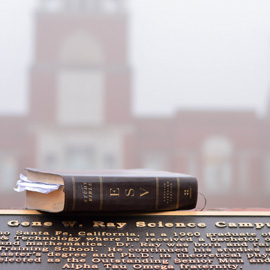Story by Bailey Bohannan, Staff writer

Two professors, Murphy Smith and Katherine Smith, will discuss whether the Bible is reliable on Feb. 22 in the Curris Center.
The Christian Faculty Network will be hosting a multiple speaker event, at 7 p.m. Feb. 22 in the Curris Center Ballroom about the reliability of the Bible.
Murray State Professors Murphy Smith and Katherine Smith will be speaking at this event; “Is the Bible Reliable? Evidence from Archaeological and Historical Research.”
Murphy, the Dill Distinguished professor of accounting in the Arthur J. Bauernfeind College of Business, said the Christian Faculty Network hosts many of these multiple speaker events, and many of them combine the biblical viewpoints that have been questioned, with historical and scientific fact to confirm the Bible’s accuracy.
“This presentation will give people a better understanding of the Bible and its reliability from an archaeological and historical perspective,” Murphy wrote in an email.
ABOUT THE SPEAKERS
Katherine Smith, assistant professor of marketing in the Arthur J. Bauernfeind College of Business, is a published professor who has many recognitions for her research, one of which includes the Murray State Emerging Scholar Award and Outstanding Research Award. Google Scholar shows that her work has been cited more than 500 times.
Murphy Smith is known for many of his research articles, books and monographs, academic conference presentations, research grants and awards for teaching and research. His work has been cited more than 1,400 times, according to Google Scholar. His research examines ethics, international accounting and the impact of religiosity on business and society.
PAST EVENTS
In past events, the subjects have ranged from Timothy Keller’s book, “The Reason for God-Belief in an Age of Skepticism,” “The Theological, Philosophical and Historical Foundations of the American Polity,” given by award-winning Murray State professor Winfield Rose and last fall’s title: “God’s Blueprint: Scientific Evidences for a God-Designed Universe.”
This specific speaker event, given by Murphy and Josh Ridley, physics professor, brought in more people than the Curris Center Theater, could contain and overflowed into standing-room only. Murphy said he hopes this year brings in just as much of a crowd filled with a variety of students, faculty, staff and the community of Murray.
EVENT PURPOSE
People have questioned the reliability of the Bible because specific historical acts have not lined up with what the Bible has told about, Murphy wrote.
Murphy gave specific examples in history where people questioned the Bible because there was no historical proof of the Hittites, which in the Bible was Israel’s ancient enemy, yet they were unaccounted for in history.
“In 1906, archaeologists discovered the ruins of Hattusas, the ancient Hittite capital at what is today called Bogazkale, Turkey,” Murphy wrote. “They also found Hittite historical records, which showed an empire flourishing in the mid-second millennium BC.”
Murphy also cited the example of when people questioned the Bible’s accuracy because the existence of Pontius Pilate, the man who presided over Jesus’ trial, couldn’t be proved. However, in 1961, the Pilate Stone was discovered in Caesarea, showing Pilate ruled Judea from 26 to 36 AD.
The event will combine history and the Bible into a single challenge to the audience: “Is the Bible reliable?” It also will provide information about historical facts that make the Bible reliable, Murphy wrote.
“The presentation challenges participants to answer the question: Is the Bible reliable?” Murphy wrote. “This is a question of interest to many people in all stages of life and in all walks of life.”
No.
The NIV admits the authorship of the gospels is unknown, with no original autographed manuscripts.
With the possible exception of some of Saul of Tarsus' ramblings, we can't be certain who wrote what in either the old OR New Testaments.
No empirical evidence for a global flood, the Ark of the Covenant, the Tower of Babel, desert-meandering "Exodants", or a single first-hand account of any of the purported zombie-uprisings.
Nothing…
From the beginning of the Christian Era, people have looked at the evidence and made decisions about whether to believe or to not believe. In general most Americans have shown respect for one another's religious views, Buddhist, Christian, Hindu, Muslim, Atheist, etc. The Bible has received particular honor throughout American history, e.g. in the most recent presidential inauguration, President Obama held his hand on two Bibles, one owned by Martin Luther King Jr. and one by Abraham Lincoln. He ended his oath of office with the words, “So Help me God.”
For questions about the Bible and the Christian faith, a good starting resource is gotquestions.org. Regarding scientific discoveries and compatibility with the Bible, a good starting resource is reasons.org.